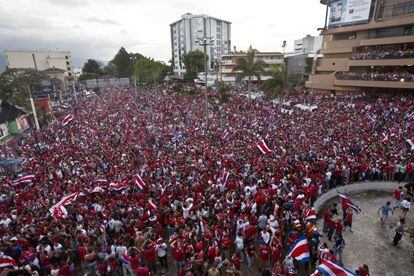The happiest Sunday in Costa Rica
The country is celebrating like never before after qualifying for the World Cup quarterfinals in Brazil

On Sunday, Costa Rica was celebrating as it had never done before. The national soccer team, which represents much more than just the sport itself, accomplished its greatest feat to date by qualifying for the quarterfinals of the World Cup in Brazil. Costa Rica rose above the challenge in a match that demanded something beyond suffering. The Central American team finally won on penalties after Greece scored in the last minute of regular time to tie the match.
People poured out into the streets for an effusive celebration. Bus passengers were euphoric and strangers hugged each other on the sidewalks. The spirit of the Costa Rican team at the 1990 World Cup in Italy touched the determined pupils of Colombian coach Jorge Luis Pinto. This was a party like none before it.
Few remember the conservative predictions of last month. This Sunday there was no place for wariness about the team that had won the “Group of Death” or about any unexpected moves from the Greeks. Costa Rican fans have been celebrating their surprise run for two weeks, but never as they did on Sunday.
The team are all heroes but some names in particular stand out: winger Bryan Ruiz, who scored Sunday’s goal, and striker Joel Campbell, an indefatigable and solitary fighter on a team that was playing with one man short after Óscar Duart had been sent off. Then there was also goalkeeper Keylor Navas, the indisputable hero against the Greeks, who made a vital contribution in the penalty shootout.
There are infinite comparisons between soccer and real life, between the team and the strength of the nation, especially in this small Central American country that struggles between its ambitions and its conformist nature, between being the land of “Yes, we can” and being the country of “We’re not doing so bad.”
Holland and Fifa are now the rivals,” screamed a woman with a baby in her arms
On Sunday, social media platforms turned into hotbeds of patriotic comments and praise for the new heroes. But there was also an anxious wait for “what will they say about us?”
Those who had been drinking and partying since morning may not be able to recall that unforgettable Sunday. The streets filled with people. Avid soccer fans and occasional supporters took part in the ritual celebration screaming “oé-oé-oé, ticos-ticooos,” kissing the Costa Rican coat of arms on their red t-shirts.
Even President Luis Guillermo Solís joined in. “We can’t hide it,” he said. “It’s a wonderful feeling. We have done the unthinkable and this is a special moment in our history. The best thing is that it makes people feel great things can be accomplished.”
Others celebrated around Plaza de la Democracia, a recognizable Costa Rican symbol along with the old barracks where the military was defeated in 1948. “Everything makes us proud today. Everything, everything,” said Jorge in the middle of the hullabaloo.
When Costa Rica’s number 10 scored the first goal, Jorge celebrated. He was sorry to see the Nicaraguan-born defense player get expelled and he suffered as Greece attacked, scoring a goal at the end of the match. Most of the country’s 4.5 million people felt the same way. Although this nation is not used to suffering, it had grown accustomed to disappointments and it knew nothing of international glory in soccer.
In Alajuela, the country’s second-largest city, thousands celebrated in Parque Juan Santamaría. The park was named after the national hero, who history credits with winning a war against American pirates in 1856. In the soul of Costa Rica burns the desire to defeat giants. “Holland and Fifa are now the rivals,” one woman shouted as she held a baby in her arms.
In the nation’s oldest city of Cartago – the seat of the nation’s post-colonial ancestry – fans celebrated next to “The Ruins,” a destroyed religious building not far from Los Ángeles Basilica. The church is home to the Vírgen of Los Ángeles, the patron saint of Costa Rica. Some of the fans in Fuente de la Hispanidad were also carrying a picture of her.
Some were saying prayers of thanks and making promises as Costa Rica gets ready to face Robben and Van Persie’s camp, a team that is not a former World Cup winner but that is not unknown either. It represents a new test for Costa Rica in the quarterfinals, an unknown challenge for the ticos. But, it is one they will enjoy taking on next Saturday. As a bugle vendor said: “We earned the right to keep suffering.”
Translation: Dyane Jean François










































